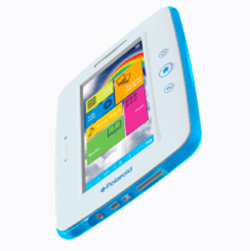January 20, 2014
ARTICLES / TOOLS: Raising a Hacker: Cool Tools to Help Kids Learn to Code
January 11, 2013
NEWS: Polaroid launches a tablet for children
full article
August 31, 2012
IT / LEARNING: Opinion: Technology can empower learning
Read more: http://www.vancouversun.com/technology/Opinion+Technology+empower+learning/7170264/story.html#ixzz257FdKmTE
August 29, 2012
IT/ PROJECTS: Partner Profile: In Malaysia, Youth Use Mapping to Address Religious Understanding
August 10, 2012
GAMES / EDUCATION: Reading, Writing, and Good Digital Citizenship: A Future Tense Event Highlights the Promise of Tech in Elementary Education
August 1, 2012
IT / NEWS: Tools for accurate data reporting
April 30, 2012
NEWS / IT: Children can play game by texting at bus stops
Read more: http://old.post-gazette.com/pg/12121/1228149-298.stm#ixzz1tWJyc5Rm
September 12, 2011
ARTICLES / RESEARCH: Textese gr8 training 4 poets of 2moro
 Research has linked children's use of text abbreviations with improved literacy.
Research has linked children's use of text abbreviations with improved literacy.
THEY'RE at it wherever you look - on the bus or train, even just walking to school. Students seem fixated on their mobile phones, nimbly tapping out text messages such as ''Wen wil i c u 2night? Cos sum1 left a msg bout ur frend bein sik. R u sik 2?''
This tide of texting has prompted warnings that the technology is leading to a decline in language skills. So are children losing the capacity to read, write and spell well?
The answer: Probably not.
Indeed, new research has found a strong link between primary school children's use of text abbreviations and improved literacy.
April 28, 2011
NEWS / IT: Children map their community using innovative technology in India
 By Diana Coulter
By Diana Coulter KOLKATA, India, 27 April 2011 - Salim Sheikh, 13, and his friends are putting their sprawling Kolkata slum on the map – literally. For a year now, they’ve been gathering data about the people, small brick huts, crowded alleys, scattered temples, trees, water pumps and other facts that identify Rishi Aurobindo Colony in eastern Kolkata.
With the support of UNICEF and local non-governmental organization Prayasam, they’ve created a colourful, hand-drawn map of their community. Soon, they will also upload much of the information onto Google Earth, one of the world’s best-known computer mapping systems. When they do, Salim says he will finally feel secure in his bustling universe.
“With this map, everyone in the world will know we are here. We are a community with many issues and ideas, just like anybody,” he says.
December 7, 2010
NEWS / IT: Vodafone launches Digital Parenting magazine (UK)
 Vodafone has published a new magazine called ‘Digital Parenting’ to help parents get to grips and get involved with their children’s digital world.
Vodafone has published a new magazine called ‘Digital Parenting’ to help parents get to grips and get involved with their children’s digital world.The magazine brings together experts from around the world to give parents the latest advice on digital issues, such as online reputation, location services, sexting, cyberbullying and illegal content. Parents, teenagers and grandparents also share their personal experiences and a series of ‘How to...’ tutorials guide parents through the safety and privacy controls on Facebook, Google, Microsoft and Vodafone.
“With so many parents telling us that they sometimes feel baffled by their children’s digital world, we decided to take a new approach,” comments Annie Mullins OBE, Global Head of Content Standards at Vodafone. “Our website already offers comprehensive advice about the digital issues affecting young people but some parents
still prefer paper-based information. Whatever their level of experience and expertise, this magazine will help parents to keep up with digital technologies and stay in control.”
Digital Parenting is available in hard copy and online on the Vodafone Parents’ Guide website. Free copies are being distributed to parenting groups, local education authorities and other relevant organisations. To order a copy of the magazine, please email publications@parentfocus.co.uk.
Source: Ofcom Media Literacy Bulletin Issue 39
November 23, 2010
ARTICLES / IT: Uganda conference addresses cutting-edge issues of technology for development
 By Terra Weikel
By Terra Weikel KAMPALA, Uganda, 19 November 2010 – How can applications for mobile phones help to meet the world’s toughest development issues? That was the big question at the Mobile Communication Technology for Development (M4D) conference held in Kampala last week.
To address this issue, the UNICEF Uganda Technology for Development (T4D) Unit teamed up with some of the most influential trendsetters in this emerging new field to offer a free ‘BarCamp’ at Makerere University.



